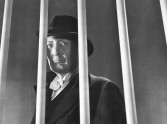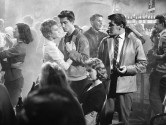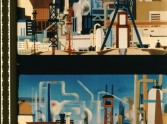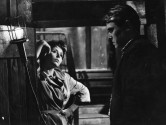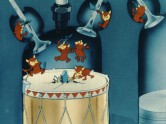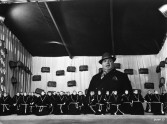Audio transcription
John Quackenbush 0:00
November 11, 2018. The Harvard Film Archive screened The Eighth Day of the Week. This is the audio recording of the introduction by film curator Olaf Möller.
Haden Guest 0:12
Good evening, ladies and gentlemen. My name is Haden Guest. I'm Director of the Harvard Film Archive. I'm really thrilled to be here tonight, to welcome a good friend, a passionate cinephile, and a brilliant curator, Olaf Möller. If ever you travel to, or spend any time in some of the more interesting film festivals, you're bound to see Olaf Möller, either standing at a podium like this, introducing films, or sitting in the very front row of the cinema, and so I'm really happy that he is doing both tonight. And Olaf, Mr. Möller, of course, is the curator of this showpiece, this really, really, inventive, and original, and one-of-a-kind program titled Mapping Gray Zones. The Inexact Beauty of Early West German Cinema. This program, this retrospective, this archaeology, of a little-known chapter in German cinema came out of a program, a retrospective that Olaf Möller curated for the Locarno Film Festival, two years ago. But it's also pointing towards another program that he is developing for the Cinema Ritrovato in Bologna next summer. And this really shows you just the sort of restless, the inexhaustible energy that drives Olaf Möller forward. He's constantly curating new programs, each one original and exciting. I think he has a program in the works for Rotterdam, and elsewhere. He also is the head of a number of different festivals, including a festival dedicated to erotic film, which I believe takes place in Finland every spring. And so, he's here tonight to talk about this program, to talk about this film, a rarely screened film by Alexander Ford, which is rare, and the first, West German-Polish co-production. I want to thank the Goethe-Institut of Boston for their support. I also want to give special thanks to my colleague, Karin Kolb, who did a lot of work for this program.
[APPLAUSE]
Ah, thank you! And she deserves a round of applause. And also for, especially her work on the subtitles. Many of the films that we're screening here are not subtitled in English, or they're not available in subtitled versions, and so, therefore, we are subtitling them electronically, and that's true for tonight's film. I'd like to ask everybody to please turn off any cell phones, any electronic devices that you have, please refrain from using them. And please come back tomorrow night, when Olaf Möller will be joined by Professor Eric Rentschler, of Harvard, of the Department of Germanic Languages and Literatures, and a foremost authority on German cinema, and they'll be having a conversation after the screening of Die Rote (The Redhead). And now, with no further ado, please join me in welcoming Olaf Möller.
[APPLAUSE]
Olaf Möller
Hi everybody. Good evening. Yeah, I’m this amazing guy that Haden talked about. Don't believe, don't believe any of his stuff.
So, let me say a few words about this film, which is one of the tragic cases of two film cultures, actually. On the one hand, that of the Federal Republic of Germany. And on the other hand, that of People's Poland. The film was originally, well, not was, it is, actually, the first co-production between the Federal Republic of Germany and People's Poland. In that regard, it was a milestone. And it was something that the film's producer, Artur Brauner, was very, very keen on. Artur Brauner, who actually turned one hundred years a few months ago, and he's still alive, crusty old bastard! He's originally from Poland. He's Jewish. If he's one hundred years old, you can imagine what he went through in the years ’39 to ’45. Brauner survived, obviously, and went to Berlin.
West Berlin, that is. Meaning the part that was occupied by, I think, actually, he went to the American zone. And there he started a film company, CCC. Originally, the first film of the CCC should have been a film called Morituri, which would have been the first, or which was the first postwar, West German —okay, we are here really in a minefield of what we are talking about. So, the first film produced in one of the three West Allied-occupied zones, in contrast to the Soviet-occupied zone. Should have been the first film from that region dealing with the Holocaust, and indeed it was, but already before that, Brauner learned a very important lesson: to make movies you have to make money. He became a legendary figure among the German producers. He was flamboyant. I mean, where other people like Kurt Ulrich, or Gero Wecker, were kind of a little bit stuffy businessmen, Brauner relished controversy. He cultivated a public image as this strange, debonair family man, who was able to mix art and commerce, like, in the end, really no other producer of that period. Being Polish, he was very keen on establishing connections between his old fatherland and the country that he would adopt. Also for business reasons. Brauner very much believed in international co-productions. He is kind of the vanguard in the FRG industry in cultivating this praxis. Poland was always his first aim, so to speak, the country that he was, that he most desired contact with, for obvious reasons. But this was a very, very, very, torturous thing. He would then, I should say, after the experience of this disaster, because the film became a disaster, he would start talking to a country that was not part of the Warsaw Pact, Yugoslavia, or, actually, the Yugoslav SFR, and there find his perfect international, central East European, co-producer. But first, Poland. And as Brauner is, as I said, somebody with very serious ambition, he would not do with anything below first-league. So, whom did he get?
He got the probably most, let’s say, troublesome and troubled figure in Polish cinema at that point, as a director, Aleksander Ford. It's quite telling, then, I mean, a few years ago, when I was in Wroclaw, in a jury, and I asked Poles about Aleksander Ford, everybody shut up, shut down. Nobody wanted to talk about Aleksander Ford. The reason is quite simple. Ford is as much, let's say, a perpetrator, as he is a victim. To me, he’s definitely more a victim than a perpetrator. Ford is one of the founders of avant-garde cinema in Poland, in the ’30s, together with people like Wanda Jakubowska, Eugeniusz Cękalski, Stanislaw Wohl, and Jerzy Toeplitz, the great film historian. Come 1939, this group, that was called START, basically dispersed in all winds. Jakubowska remained in Poland, went to a concentration camp, to survive and then make one of the first monuments of fiction filmmaking, about the concentration camps, Ostatni etap, First Station. Cękalski went to England, and fought, went to the Soviet Union, and returned as an officer of the Polish units in the Soviet Army, to Poland. Aleksander Ford is, in fact, the architect of People's Poland cinema. He was the main administrator, after the end of the war, he built up the whole industry. People feared him, and with good reason. He could be quite vengeful. On the other hand, he was also a true maverick, at heart, of filmmaking. So he was not one of those stuffy bureaucrats, he was really a powerhouse. And he was a powerhouse that was also thinking beyond Poland. So he had a major interest, like Brauner, to expand certain boundaries. That this would become a very tragic aspect of his career, he probably could not foresee when he started work on this film. Ford—to basically already tell that rather sad story—became a victim of the anti-Semitic purge of 1968, in Poland, after already having flirted with productions outside of Poland, this one, partly, then very seriously, a film for Lazar Wechsler in the mid-sixties. In Switzerland, he actually left the country, was forced to leave the country. He was able to make two more films, one in Denmark, one in Israel, both very tortured affairs. He went to the United States, and took his life in a motel in Florida, never to see Poland again. And actually, never to be around for a screening of this film, because Der achte Wochentag was destined to become the longest-shelved film in Polish history.
More talent: the screenwriter is one of the boy wonders of young Polish literature, Marek Hłasko. And he would find the love of his life during the making of this film, Sonja Ziemann. Just this, by way of perspective. So, the film gets made, after all, finally.
The film gets entered for Cannes, and it gets accepted, in 1958. Shortly before the festival, Polish authorities withdraw the film from the festival. The film becomes an affair non grata. The film is shelved, despite the importance of Ford. Why?
Polish censors at that time said that the film was painting a way too bleak picture of postwar Poland. If one looks at Hłasko’s novel, actually, the film is quite glamorizing it, because the novel, or novella, is actually less bleak. It’s not that bleak. But the film comes at the tail end of something that was referred to as the Polish Black Series, which was mainly documentaries, made in the years ’55, -6, -7. And that were all painting, really, a rather... well, Poland didn't look too sexy in those movies. The films were deemed a problem from the higher-ups, and the film kind of went down with them. Now it gets interesting, the next festival after Cannes would have been the Berlinale. Now the film was never discussed for the Berlinale. And that's remarkable, because ’58 was a really difficult year for German films at the Berlinale. There are quite a lot of newspaper items reporting on the selection process that are saying, "And still no German competition entry! Where is the German movie?" Why was this film never mentioned? Because it's a Polish co-production. And films from the Warsaw Block states, at that point, essentially boycotted the Berlinale. It would have been too touchy to basically have the film there. So it went to Venice. And there, it was basically screened as a German entry. So remember, in Cannes, Poland entered it, and then withdrew it. So it was a Polish film there. In Venice, it was suddenly a German film. Or a West German film, to be more precise. So, what happened in Venice was a little bit depressing. The film was received okay. If we read the reviews, it's like, hmm.
What's really horrifying is that quite a few of the reviews repeat a phrase that I can't remember who wrote originally, saying this film is “un-Germanic” in style and content. The film would later open in West Germany, actually, its premiere in Germany was in my hometown, Cologne. And nobody cared. The film sunk. Completely unremembered film. It became this strange kind of episode in film cultural relations that nobody even cared about. In Venice, they had really also the bad luck that there was another German competition entry that was then destined to become immediate film history, Das Mädchen Rosemarie, by Rolf Thiele. So the, kind of the hip modernism of Thiele was considered to be much more attractive, with its Brechtian elements, to the realism of Aleksander Ford. To make things also a little bit more complicated, there are actually two versions of the film, there’s a Polish version and a German version. The Polish version is, okay, there are some minor differences that may not be that minor. Sonja Ziemann, for example, is, in the Polish version, married, and in the German, she isn't. But there are also some scenes where discussions, for example, continue on, and on, and on, about, for example, wartime memories, that are missing in the German version. So, the difference is, the films have almost the same running time, but if one analyzes it, the Polish version is, in fact, quite Polish, also with many concerns that are raised there, while the German version is also quite German. Let me point out one last detail about the film, which is the main star, Sonja Ziemann. Sonja Ziemann was one of the superstars of West German cinema, probably besides Ruth Leuwerik, and later on, a little bit, Maria Schell, the female star. Ziemann was mainly known for her roles in what we call Heimatfilme, so she was always this healthy, cheery, young lady. And this was the first film, or people say the, it's actually not really the first film, like the first big film, in which she plays a very serious part, and in which she plays a grown-up woman, an obviously grown-up woman, which in West German context of that period, means she obviously has had sex. So. And actually, this is a film about a couple trying to find a place where they can have sex, to simplify things a little bit. What people thought of Sonja Ziemann is actually quite nicely expressed in an absolutely horrendous cover from a German magazine that was actually featuring a little story about the making of the film. On this cover, Sonja Ziemann is shown in a very skimpy cowboy dress for kids. So, kind of a cowboy bikini top, and a weird, cheeky little hat, and two very fake pistols, and stuff. So it looks terrible. And the title says, “Our Sunny Is Growing Up.” So it's basically, I mean, she almost like an infant in the other films. And that's how she was sold, even when she's basically, finally playing an adult role, she’s still sold as this kind of, yeah, underage, cheery, healthy little girl. After this film, she definitely was never again cheery and healthy. And I can assure you, after you have seen her say, “Slap him again!,” you don't want to see her, ever, as a cheery, healthy little girl. So, this film became a disaster. It was easily forgotten.
And I can say, with a lot of happiness, when we did this thing in Locarno, that was one of the films everybody was talking about. That was the film, that was one of the feature films where everybody was like, where on earth did this come from? And I could only say, as a great admirer of Aleksander Ford, I'm quite happy that, in this way, this great work, of this extraordinary, underappreciated Polish filmmaker, who was daring to do things others didn’t do, together with a crazy producer, daring to do what others did not even think about, that this, in some way, got its vindication. So, let's take a look at the film, and I'm still around afterwards, if you have questions. Now enjoy, and I hope this wasn't too boring. Thank you.
[APPLAUSE]
©Harvard Film Archive


